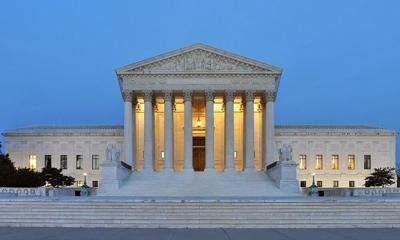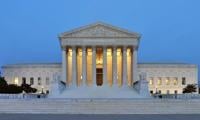
U.S. Supreme Court
WASHINGTON, D.C. - The U.S. Supreme Court will not take up an appeal from Chicago's Saint Anthony Hospital, which had sought to sue the state of Illinois to force the state to more quickly pay Medicaid payments when the hospitals believe the state's network of managed care groups aren't paying enough money, quickly enough, to satisfy Medicaid law.
On Oct. 20, the U.S. Supreme Court denied Saint Anthony's petition to review and ultimately overturn the 2025 decision of a federal appeals court in Chicago.
Ultimately, both sides agreed the question would be decided by a 2025 Supreme Court decision, notable for agreeing that states had the constitutional and legal authority to cut off Medicaid funding for abortion provider Planned Parenthood.
That ruling, in the case known as Medina v Planned Parenthood South Atlantic, more largely dealt with the question of whether individuals had the ability to sue state governments over how they administer federally-supplied Medicaid dollars.
In filings at the Supreme Court, Saint Anthony Hospital and the state of Illinois squared off over whether the Medina ruling should also be read to prevent hospitals and other medical care providers from suing states over payments that have not abided by the payment timeliness requirements under federal Medicaid law.
The Supreme Court opted not to use Saint Anthony's case to take up the matter directly. However, the high court let stand the Seventh Circuit's decision blocking Saint Anthony from suing, potentially signaling the high court's justices may agree with Illinois' position concerning the impact of the Medina decision on such legal claims against states over Medicaid payments.
The decision to reject the hospital's appeal was issued with no dissents.
The legal fight between Saint Anthony and the state of Illinois has continued in federal courts in Chicago since 2020.
At that time, Saint Anthony sought permission to sue the state because it believed Blue Cross Blue Shield and other so-called managed care organizations (MCOs) “repeatedly and systematically delayed and reduced Medicaid payments.” Saint Anthony serves as one of 40 Illinois “safety net” hospitals, which generally provide health care services to poorer communities and lower income patients who may rely on government aid, compared to other hospitals.
Under the program, the state pays a flat, per-patient monthly fee to a private insurer, and the insurer then pays the providers for whichever services are delivered under Medicaid. The MCO keeps the difference between its state income and expenses paid to providers. But Saint Anthony asserted payments through MCOs have come in slow and allegedly less than full. The hospital claims the situation forced it to burn through nearly all its cash reserves.
A federal judge sided with the state, dismissing the lawsuit.
However, in 2022 and again in 2024 - after the Supreme Court directed them to take a second look - a three-judge panel of the U.S. Seventh Circuit Court of Appeals ruled 2-1 that Saint Anthony Hospital could sue.
In the 2024 ruling, Seventh Circuit judges David Hamilton and Diane Wood said they believed the federal Medicaid Act gives "providers like (Saint Anthony Hospital) ... contractual rights against MCOs, but also federal rights to have state officials use the state’s contractual rights and do their jobs by implementing procedures and systems to ensure that MCOs actually make the promised timely payments."
However, the full Seventh Circuit court took up the case on so-called en banc review, with the court's majority saying they recognized the "enormous question" that would arise from allowing hospitals to sue states in such a way that it would "alter the administration of a multibillion-dollar Medicaid program."
The Seventh's Circuit full complement of judges ruled 9-3 that Saint Anthony Hospital lacked the ability to sue, because the timely payment provisions involve contracts between the state and MCOs, not necessarily the hospitals or other care providers who would ultimately receive the money for services rendered to Medicaid recipients.
“It would turn federal trial courts into de facto Medicaid claims processors,” wrote Seventh Circuit Judge Michael Brennan for the majority in a March 2025 en banc decision.
“Thousands of claims worth millions of dollars could be routed to the district courts," Brennan wrote. "Thrusting federal tribunals into payment processing is a dubious solution to the alleged late-payment problem. This is especially so when Congress has provided the states with the tools to address MCOs’ failures to comply with contractual terms — including payment schedules.”
Following that ruling, Saint Anthony filed its latest petition to the Supreme Court for review.
In Supreme Court filings, Saint Anthony continued to argue it should have the right to sue, saying it believed dissenting judges in the en banc case, which again included Judge Hamilton, got the question right.
They said they believed the Supreme Court's June 2025 ruling in Medina also didn't change their case, because they argued that decision did not overturn a 1990 ruling known as Wilder v Virginia Hospital Association, which had ruled hospitals could sue states for not paying enough under Medicaid to satisfy federal Medicaid law.
In response, the state argued the Seventh Circuit's en banc ruling correctly found lower courts should not "'consult Wilder' and similar cases" when deciding if the Medicaid Act gives hospitals "an enforceable individual right" to sue. Illinois argued the Medina decision reinforces that reasoning, meaning Wilder can no longer be considered "good law" for interpreting rights under Medicaid.
Saint Anthony Hospital was represented in the case by attorneys Edward W. Feldman, Michael L. Shakman William J. Katt, Mary Eileen Cunniff Wells and Kay L. Dawson, of the firm of Miller Shakman Levine & Feldman, of Chicago.



